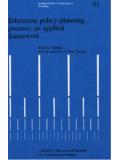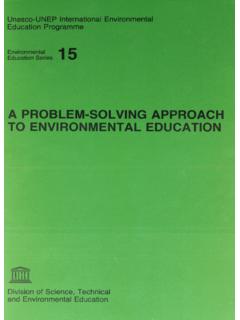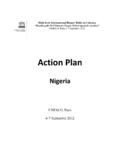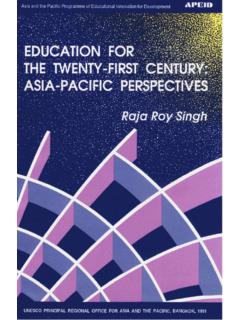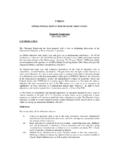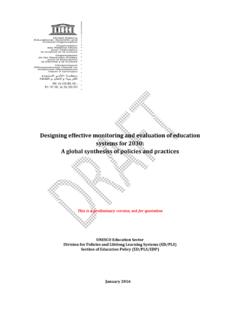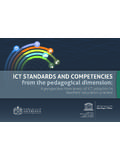Transcription of The Rio Declaration on Environment and Development (1992)
1 THE RIO DECLARATIONONENVIRONMENT AND Development (1992)PREAMBLEThe United Nations Conference on Environment and Development ,Having met at Rio de janeiro from 3 to 14 June 1992,Reaffirming the Declaration of the United Nations Conference on the Human Environment ,adopted at Stockholm on 16 June 1972, and seeking to build upon it,With the goal of establishing a new and equitable global partnership through the creation ofnew levels of co-operation among States, key sectors of societies and people,Working towards international agreements which respect the interests of all and protect theintegrity of the global environmental and developmental system,Recognizing the integral and interdependent nature of the Earth, our home,Proclaims that:PRINCIPLE 1 Human beings are at the centre of concerns for sustainable Development .
2 They are entitled to ahealthy and productive life in harmony with 2 States have, in accordance with the Charter of the United Nations and the principles of internationallaw, the sovereign right to exploit their own resources pursuant to their own environmental anddevelopmental policies, and the responsibility to ensure that activities within their jurisdiction or controldo not cause damage to the Environment of other States or of areas beyond the limits of 3 The right to Development must be fulfilled so as to equitably meet developmental andenvironmental needs of present and future 4In order to achieve sustainable Development , environmental protection shall constitute anintegral part of the Development process and cannot be considered in isolation from 5 All States and all people shall co-operate in the essential task of eradicating poverty as anindispensable requirement for sustainable Development , in order to decrease the disparities instandards of living and better meet the needs of the majority of the people of the 6 The special situation and needs of developing countries, particularly the least developed andthose most environmentally vulnerable, shall be given special priority.
3 International actions in the fieldof Environment and Development should also address the interests and needs of all 7 States shall co-operate in a spirit of global partnership to conserve, protect and restore thehealth and integrity of the Earth's ecosystem. In view of the different contributions to globalenvironmental degradation, States have common but differentiated responsibilities. The developedcountries acknowledge the responsibility that they bear in the international pursuit of sustainabledevelopment in view of the pressures their societies place on the global Environment and of thetechnologies and financial resources they 8To achieve sustainable Development and a higher quality of life for all people, States shouldreduce and eliminate unsustainable patterns of production and consumption and promote appropriatedemographic 9 States should co-operate to strengthen endogenous capacity-building for sustainabledevelopment by improving scientific understanding through exchanges of scientific and technologicalknowledge, and by enhancing the Development , adaptation, diffusion and transfer of technologies.
4 Including new and innovative 10 Environmental issues are best handled with the participation of all concerned citizens, at therelevant level. At the national level, each individual shall have appropriate access to informationconcerning the Environment that is held by public authorities, including information on hazardousmaterials and activities in their communities, and the opportunity to participate in decision-makingprocesses. States shall facilitate and encourage public awareness and participation by makinginformation widely available. Effective access to judicial and administrative proceedings, includingredress and remedy, shall be 11 States shall enact effective environmental legislation. Environmental standards, managementobjectives and priorities should reflect the environmental and developmental context to which theyapply.
5 Standards applied by some countries may be inappropriate and of unwarranted economic andsocial cost to other countries, in particular developing 12 States should co-operate to promote a supportive and open international economic system thatwould lead to economic growth and sustainable Development in all countries, to better address theproblems of environmental degradation. Trade policy measures for environmental purposes shouldnot constitute a means of arbitrary or unjustifiable discrimination or a disguised restriction oninternational trade. Unilateral actions to deal with environmental challenges outside the jurisdiction ofthe importing country should be avoided. Environmental measures addressing transboundary orglobal environmental problems should, as far as possible, be based on an international 13 States shall develop national law regarding liability and compensation for the victims of pollutionand other environmental damage.
6 States shall also co-operate in an expeditious and moredetermined manner to develop further international law regarding liability and compensation foradverse effects of environmental damage caused by activities within their jurisdiction or control toareas beyond their 14 States should effectively co-operate to discourage or prevent the relocation and transfer toother States of any activities and substances that cause severe environmental degradation or arefound to be harmful to human 15In order to protect the Environment , the precautionary approach shall be widely applied byStates according to their capabilities. Where there are threats of serious or irreversible damage, lackof full scientific certainty shall not be used as a reason for postponing cost-effective measures toprevent environmental 16 National authorities should endeavour to promote the internalization of environmental costs andthe use of economic instruments, taking into account the approach that the polluter should, inprinciple, bear the cost of pollution, with due regard to the public interest and without distortinginternational trade and 17 Environmental impact assessment, as a national instrument.
7 Shall be undertaken for proposedactivities that are likely to have a significant adverse impact on the Environment and are subject to adecision of a competent national 18 States shall immediately notify other States of any natural disasters or other emergencies thatare likely to produce sudden harmful effects on the Environment of those States. Every effort shall bemade by the international community to help States so 19 States shall provide prior and timely notification and relevant information to potentially affectedStates on activities that may have a significant adverse transboundary environmental effect and shallconsult with those States at an early stage and in good 20 Women have a vital role in environmental management and Development . Their fullparticipation is therefore essential to achieve sustainable 21 The creativity, ideals and courage of the youth of the world should be mobilized to forge aglobal partnership in order to achieve sustainable Development and ensure a better future for 22 Indigenous people and their communities, and other local communities, have a vital role inenvironmental management and Development because of their knowledge and traditional should recognize and duly support their identity, culture and interests and enable theireffective participation in the achievement of sustainable 23 The Environment and natural resources of people under oppression, domination andoccupation shall be 24 Warfare is inherently destructive of sustainable Development .
8 States shall therefore respectinternational law providing protection for the Environment in times of armed conflict and co-operate inits further Development , as 25 Peace, Development and environmental protection are interdependent and 26 States shall resolve all their environmental disputes peacefully and by appropriate means inaccordance with the Charter of the United 27 States and people shall co-operate in good faith and in a spirit of partnership in the fulfilment ofthe principles embodied in this Declaration and in the further Development of international law in thefield of sustainable EARTH SUMMIT AND AGENDA 21 From: Global Tomorrow Coalition Sustainable Development Tool United Nations Conference on Environment and Development (UNCED), which took placein Rio de janeiro in June 1992, was a milestone event bringing together Heads of State and Chiefs ofGovernment than any other meeting in the history of international relations, along with seniordiplomats and government officials from around the globe, delegates from United Nations agencies,officials of international organizations, and many thousands of nongovernmental organization (NGO)representatives and made it plain that we can no longer think of Environment and economic and socialdevelopment as isolated fields.
9 In addition to major international treaties and agreements concludedat the Earth Summit on issues of global climate change, biological diversity, deforestation, anddesertification, the Declaration of Rio contains fundamental principles on which nations can base theirfuture decisions and policies, considering the environmental implications of 21 was a special product of the Earth Summit. It is a vast work program for the 21stcentury, approved by consensus among the world leaders in Rio, representing over 98% of theworld's population. This historic document is 700 pages long and embraces all areas of sustainabledevelopment. A comprehensive blueprint for a global partnership, Agenda 21 strives to reconcile thetwin requirements of a high quality Environment and a healthy economy for all people of the world,while identifying key areas of responsibility as well as offering preliminary cost estimates for framing of Agenda 21 began well over a decade ago.
10 By resolution 38/161 in December1983, the UN General Assembly convened the World Commission on Environment and Development (WCED), chaired by Ms. Gro Harlem Brundtland, Prime Minister of Norway. The 22 distinguishedmembers of the WCED worked for three years, conducting a series of public hearings throughout theworld, reviewing specially commissioned research and reports, and carrying on extensiveinternational dialogue, to produce their unanimous report, Our Common Future, which was presentedto the UN General Assembly in October 1987 and disseminated world-wide. The report placed theconcept of sustainable Development as an urgent imperative on the global agenda, and led directly tothe decision by the United Nations to convene the 1992 Earth 21 reflects not only the testimony and counsel of the numerous technical and scientificadvisers mobilized by the UNCED Secretariat under the leadership of Maurice F.
